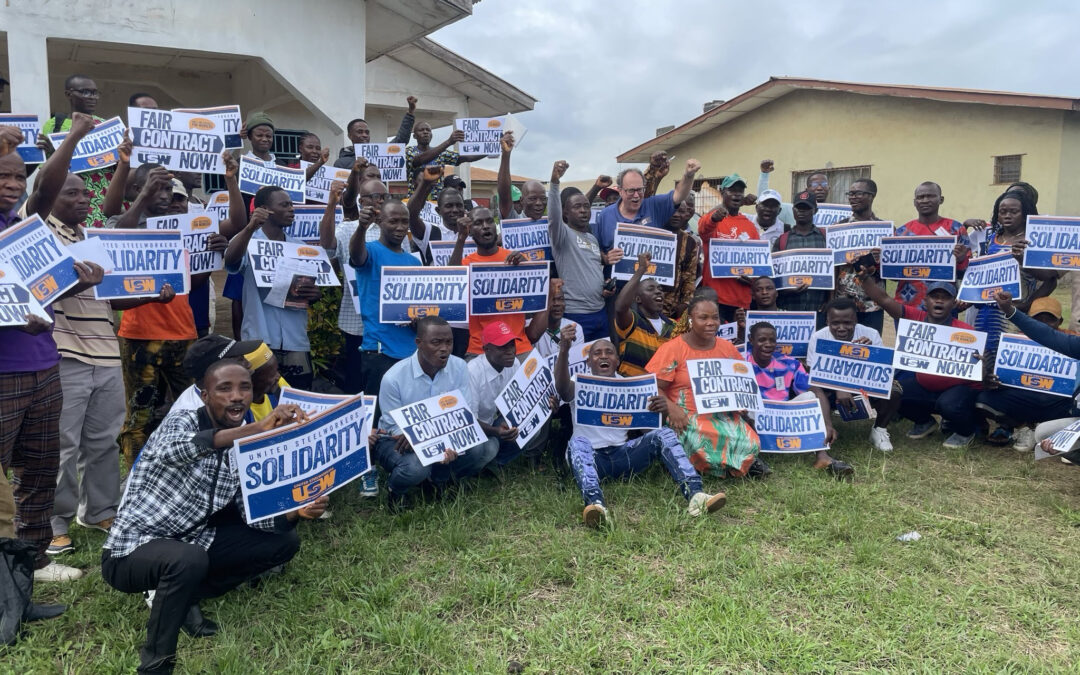
Jun 26, 2025
The Solidarity Center, in partnership with the United Steelworkers International (USW), stands in support of all workers on the Firestone Liberia‘s plantation in Harbel whose low-paid and precarious labor brings raw latex from the plantation to tire manufacturing plants in North America and Europe.
“Now, more than ever, working people have to stick together and work together to win the changes we need,” says USW Vice President Kevin Mapp, who this week attended a series of union workshops at a critical juncture for Firestone Liberia’s contract workers.
The company’s contract workers–who work for lower wages with fewer social protections and benefits as compared to Firestone Liberia’s directly hired, unionized, workers–are poised to negotiate with their employers for a fairer deal. Although more than 90 percent of Firestone-Liberia’s contract workers voted almost nine months ago for union representation, their new union, the Sub-Contractor Workers Union of Firestone (SCWUOF), has yet to achieve its first agreements.
While Firestone Liberia has long profited from the grueling labor of rubber workers, the increasing use of lower-paid contract workers—often denied the rights, protections, and dignity afforded to unionized staff—raises serious concerns under international labor standards and mirrors global patterns of exploitation that have drawn forced labor allegations. This system effectively creates a second tier of workers whose vulnerability is built into the business model, echoing the very abuses international law is meant to prevent.
Safe jobs, healthy communities, fair wages, the ability to care for one’s family and a chance to retire with dignity are the dreams and aspirations of all working people in Liberia and around the world, says the USW.
Firestone Liberia’s contract workers’ efforts to negotiate a fair contract are fully supported by Firestone Liberia’s long-standing union for direct-hire workers: The Firestone Agricultural Workers’ Union of Liberia (FAWUL) has long argued against unfair competition with exploited contract workers, whose numbers are steadily increasing over time.
“We owe it to generation after generation of workers who have suffered to secure good jobs and dignity for ALL,” said FAWUL Chairperson Rodennick Bongorlee immediately after contract workers won their hard-fought election campaign for union representation last year.
Through a “buddy system” of mentoring and regular skills-training workshops, USW’s solidarity campaign is helping experienced FAWUL leaders transfer their collective bargaining and other union-building skills to SCWUOF.
“I’m so proud of the partnership among USW, FAWUL and the new Firestone contractors union in Liberia. We are indeed stronger together,” says Mapp.
By FAWUL’s calculations, some 3,500 full-time jobs were lost from 2019 through 2024 to Firestone-imposed transfers to contract positions, lay-offs and forced retirements. FAWUL in 2007 was awarded the AFL-CIO’s annual George Meany-Lane Kirkland Human Rights Award in recognition of the union’s “extraordinary courage” in successfully organizing more than 4,000 Firestone Liberia workers for the first time in the company’s 82-year existence in the country. Firestone Liberia is a direct subsidiary of Firestone Natural Rubber Company and an indirect subsidiary of Bridgestone Americas – part of the Bridgestone Group.
The Solidarity Center, in partnership with USW International, works with Liberian unions in key extractive industries such as mining and rubber to support them as they better serve their members and assist workers in forming unions.
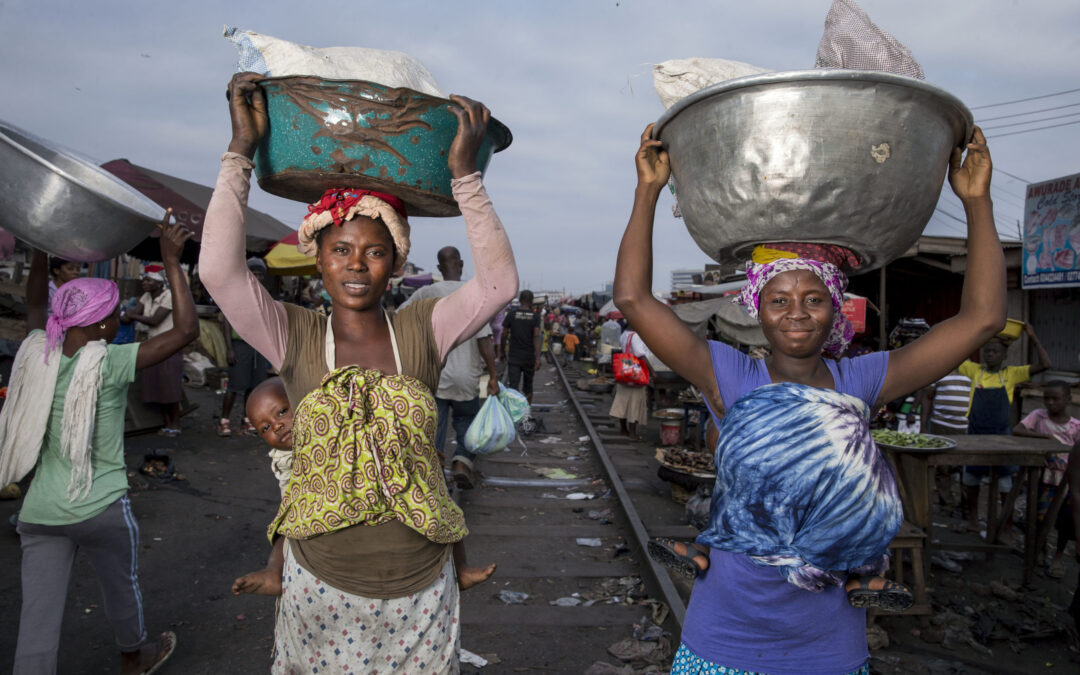
Dec 9, 2024
A four-year, regional, health care rights campaign led by the Organization of Trade Unions of West Africa (OTUWA) is expanding its success and influence in the region with Sierra Leone’s Finance Minister last month announcing a 2 percent increase in the country’s budget allocation for the health sector, from 7 percent in 2024 to 9 percent in 2025.
“The Sierra Leone Labor Congress appreciates the increase as a success of our health care campaign,” says OTUWA Executive Secretary John Odah, while noting that Sierra Leone’s government has not met the 15 percent minimum annual budgetary health allocation to which African heads of state agreed in the landmark 2001 Abuja Declaration.
Like many countries in the region, in the context of mounting national debt, multinational tax dodging and illicit financial flows, Sierra Leone’s government is struggling to provide essential services to its citizens, including accessible health care.
Sierra Leone’s health care funding increase builds on the success of OTUWA’s “Health Care Is a Human Right” campaign this year in Nigeria, where the federal government in April announced a disbursement of almost $70 million to bolster the country’s health infrastructure.
Given that more than 80 percent of West Africa’s working people earn their living in poorly paid and uncertain informal-sector jobs, lack of access to state-provided health care or health insurance is placing an unfair financial burden on low‐income individuals and households, say unions. A United Nations report noted that 381 million people, or almost 5 percent of the world’s population, were pushed into extreme poverty in 2019 by out-of-pocket health expenditures.
OTUWA’s health care rights campaign unites West Africa’s unions in a fight for equal and fair health care access for all. Campaign participants, which include OTUWA affiliates and national health care unions, have been advocating since 2020 for the protection of health worker rights and effective, accessible health care for all with national and continent-wide African Union legislators and policymakers, including the Economic Community of West African States (ECOWAS) Parliament. An OTUWA survey of 700 health workers living in Gambia, Ghana, Nigeria, Senegal, Sierra Leone and Togo provided a window into the region’s health-sector shortcomings and presented a raft of recommendations that included increased funding for the health care sector across the region. This year, the campaign expanded its influence through an alliance with Public Services International, a global union federation that represents 30 million workers in 154 countries and, to preserve public resources, added good governance to its demands.
“We celebrate with our Sierra Leonean brothers and sisters and will continue to support unions that are demanding more investment by governments in the health of their citizens,” says Solidarity Center Africa Regional Program Director Christopher Johnson.
OTUWA represents trade union national centers in the 15 West African countries comprising ECOWAS. None of West Africa’s signatory governments–required by ECOWAS Fundamental Principles to promote and protect human rights in accordance with the African Union (AU) Charter on Human and People’s Rights, including provision of social protections such as health care–are implementing the 15 percent minimum annual budgetary health allocation.
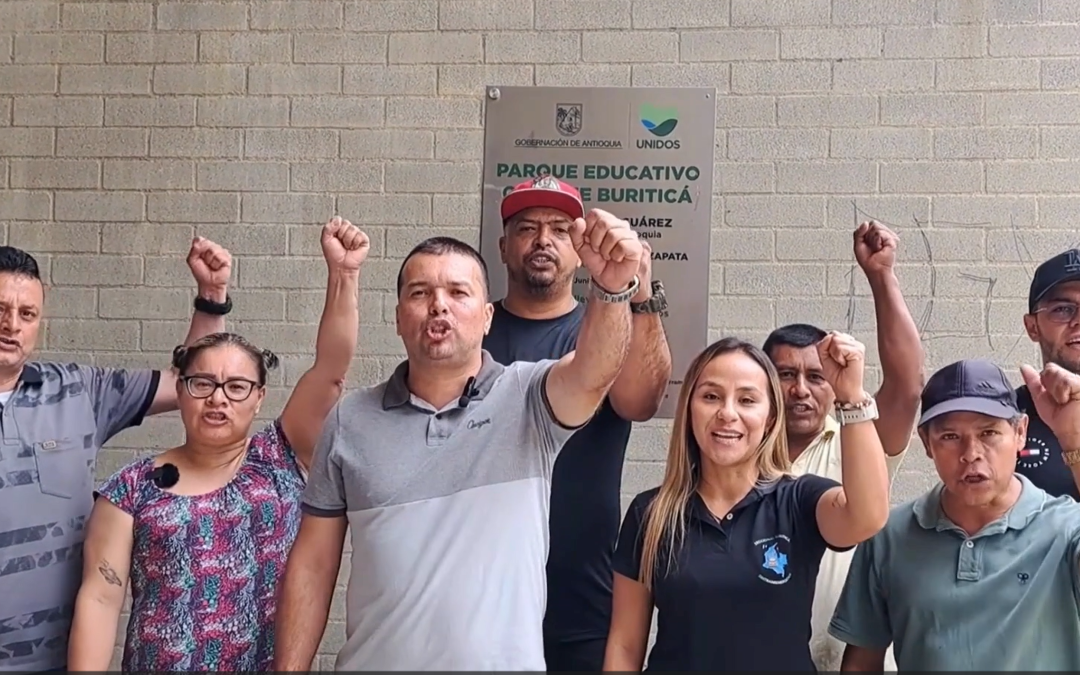
Nov 10, 2024
Gold miners in Colombia won their first-ever contract, one that included an annual 3.5 percent wage increase and coverage of all sick leave up to 180 days. The collective bargaining agreement, signed with international corporation Zijin Continental Gold, critically incorporates respect and protection of workers’ rights on the job.
“I’m proud to advocate for workers’ rights and benefits at the Zijin Continental Gold Company. That’s what we seek: to protect workers and ensure they and their families have a better quality of life,” says Sergio Alexander Moreno Moreno, president of Sintramienergética Seccional Buriticá. The union includes more than 450 members at the Buriticá branch and 4,000 members nationwide.
The miners endure difficult conditions with low pay and, over 15 years, had won several arbitration awards. With Solidarity Center support, workers reached the August agreement with the company through negotiation and joint dialogue with the government among representatives of governments, employers and workers on issues of common interest relating to economic and social policies.
The union also negotiated creation of a Labor Dialogue Committee to monitor the contract and ensure its compliance, an essential part of the agreement, says Daniel Esneider Valencia Duque, secretary of collective affairs and labor disputes.
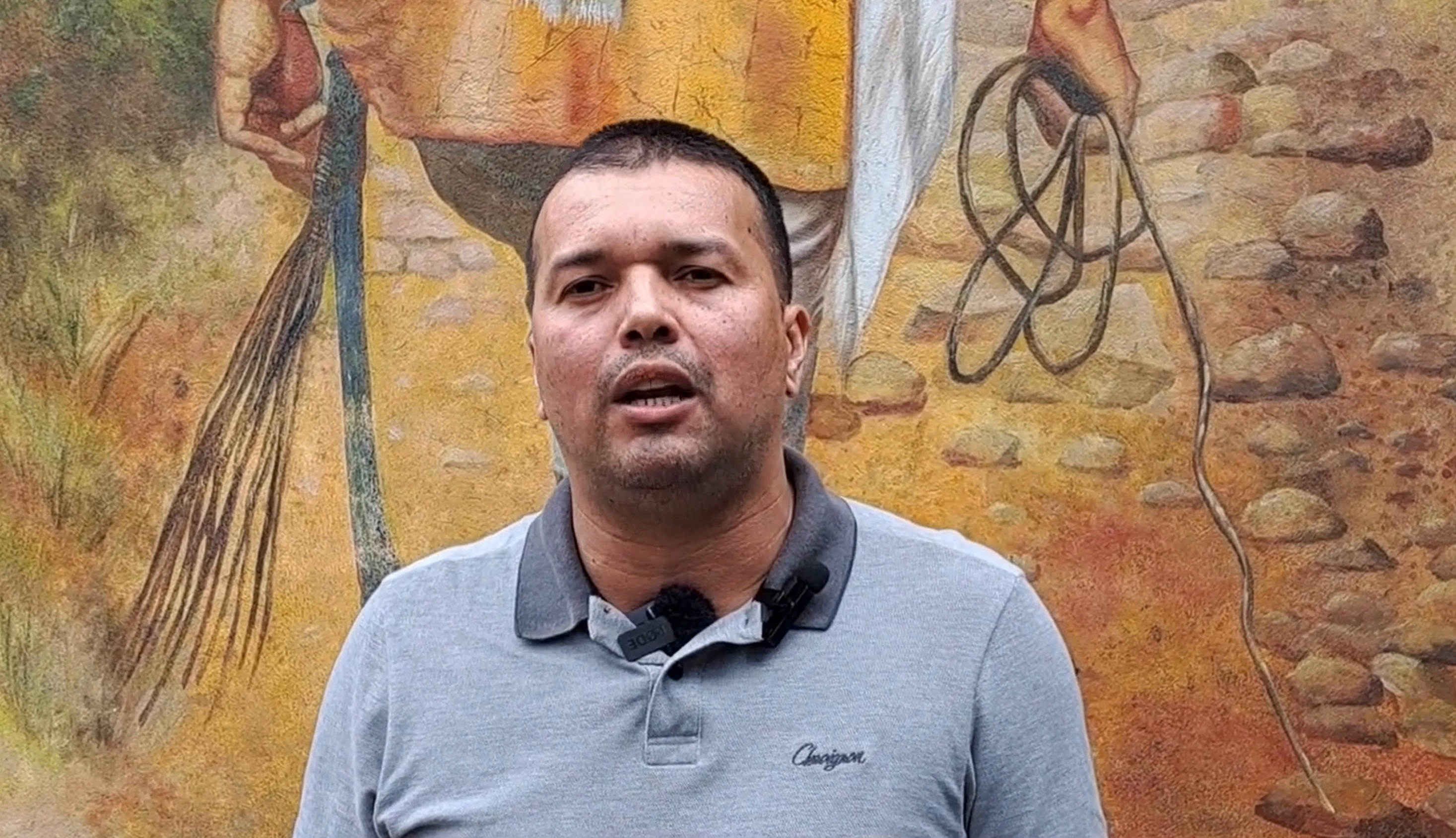
The new contract for gold miners is key to establishing worker rights, says Sergio Moreno, union president.
Achieving Gains with Partnership
To achieve the significant gains for workers, the Solidarity Center engaged with union leadership in a comparative analysis of past arbitration agreements and offered communication support during the bargaining process.
“They helped us draft our fair list of demands, when we reached the collective bargaining stage,” says Cristian Rizo, union general secretary. “The Solidarity Center has greatly supported us in our growth.”
Bolstering skills training and strengthening miners collaboration is part of Solidarity Center’s regional efforts in Brazil, Colombia and Peru, where multinational corporations force miners to endure long days in difficult and often dangerous conditions.
Sharing the benefits of their union in a video, workers describe how they will benefit with the new contract, and urge others to join unions to defend their rights.
“Unity is strength.”

Oct 28, 2024
More than 200 International Lawyers Assisting Workers Network (ILAW) members gathered in Casablanca, Morocco, October 9 to 11 at their 2024 Global Conference to share ideas and to collaborate on legal strategies to promote and defend worker rights.
The Solidarity Center established the ILAW Network in 2018 as a way for pro-labor lawyers worldwide to bring together legal practitioners and scholars in an exchange of ideas and information in order to best represent the rights and interests of workers and their organizations wherever they may be.
ILAW lawyers working together have taken legal strategies that are successful in one country and deploy them elsewhere. In doing so, they have set new legal precedents that build a stronger foundation for the expansion of worker rights around the globe.
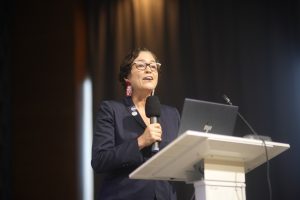
Credit: Mosa’ab Elshamy
Solidarity Center Executive Director Shawna Bader-Blau welcomed attendees, describing the network of over 1,300 members in more than 90 countries as “uniquely situated to take on global corporations suppressing worker rights.”
She cited the successful advocacy of women labor lawyers for new International Labor Organization (ILO) treaties, like Convention 189 on domestic workers and Convention 190 on violence and harassment.
Solidarity Center Rule of Law Director and ILAW Network Chair Jeffrey Vogt laid out the conference’s purpose. “Around the world, the rights of workers and unions are under attack. Employers are well-resourced and coordinated in their efforts to shape law and policy. It is essential that workers and unions do the same. Through ILAW, we can learn from each other, build from successes and failures, and strengthen our impact through legal solidarity.”
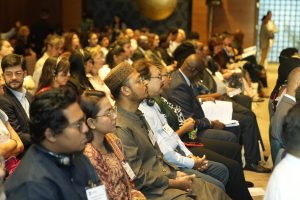
Credit: Mosa’ab Elshamy
The importance of interconnectedness was woven throughout many plenary sessions and discussions. Networking, learning from and collaborating across countries and regions was a key part of the conference, as attendees talked about the commonalities of their work.
The opening plenary, moderated by Solidarity Center’s Rule of Law Deputy Director Monika Mehta, focused on the impact of technology in the world of work, including but not only digital platform workers, from Amazon warehouses workers to content moderators for major social media firms.
Panelist Liz Lenjo described the content moderators in Kenya who filed a lawsuit against Meta (the parent company of Facebook, Instagram and Threads) and Sama, the local contractor, citing poor working conditions, union busting and inadequate mental health support.
These workers were hired to screen posts, videos and messages for Facebook and remove harmful or offensive content. Workers spent hours viewing violent and disturbing images and videos. They were left on their own to deal with the psychological trauma. In a landmark ruling, the Kenyan court determined it had jurisdiction over Meta.
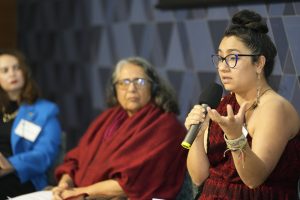
Credit: Mosa’ab Elshamy
Sandra Muñoz discussed how women in Colombia’s parliament recently passed legislation to harassment in the workplace and linked the fight for equality to equality for all. “Unless we can overcome inequality,” Muñoz said, “we can’t overcome inequality as a whole.”
Kayan Leung also described successful litigation she undertook in South Africa to establish parity in paid parental leave in order that the responsibility of care does not default to women. The ILAW Network filed an amicus brief in that case.
During the panel on Just Transition, Angelica Maria Palacios Martinez spoke about the efforts to get Colombia’s government to recognize trade unions’ essential role in Just Transition and protecting the whole population. “From the trade union world, we have called out the government to recognize us as a key player, she said, “so that these public policies are focused on protecting the entire population, and in particular, protecting the workers.”
Abdullah Nahid of the Maldives, one of the countries most affected by climate change, described union efforts to support workers in the tourism and fisheries sector.
On the panel on the informal economy, Madhulika Tatigotla discussed the growth of the informal economy in India. India’s informal economy continues to grow, as the formal sector continues to informalize as, for example, 40 percent of factory workers are now on temporary contracts. Recently, workers and their legal advocates developed a comprehensive draft law for workers in the informal economy to extend labor rights and benefits.
In the final right to strike plenary, Paapa Danquah noted the increasing international threats to the right to strike, linking it to civil liberties. “The attack on the right to strike on the international level is the first step to taking away the right to strike everywhere,” Danquah said. “Whenever you see attacks on the right to strike, there are also attacks on collective bargaining and civil liberty.” He described how the ITUC was involved in litigation before the International Court of Justice to protect the right to strike as a principle of international law.
As the conference ended, attendees discussed priorities for the coming year, from more collaboration between all members to deepening national and regional labor law networks, cross-pollination between ILAW regions, increasing engagement with social movements and Indigenous communities in order to support union growth. Attendees left the conference energized and committed to forging a robust labor law network for a stronger global labor movement.
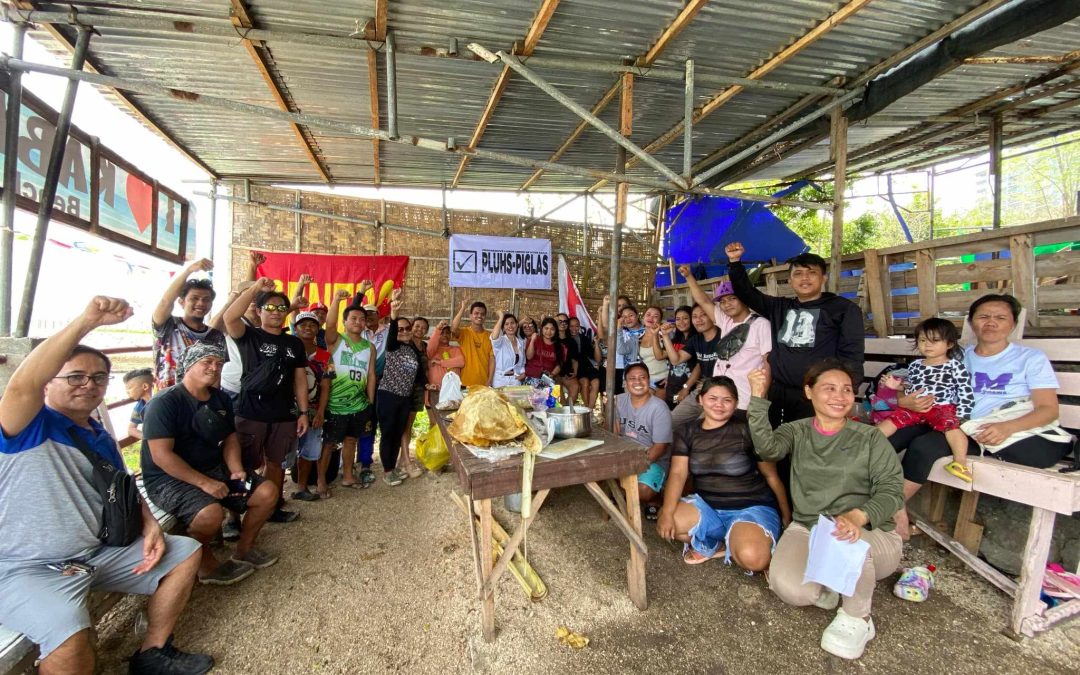
Oct 1, 2024
Organizing a union of more than 200 factory workers in an economic processing zone is a feat in itself, but doing so in just nine months amid management intimidation proves the power of solidarity.
On September 3, more than 60 percent of rank-and-file workers from Hyde Sails Cebu, Inc., a sail manufacturing company, voted union yes in their certification election, with high hopes of negotiating for better benefits and wage increases.
Lucil T. Loquinario, president of the Progressive Labor Union of Hyde Sails (PLUHS-PIGLAS), said earlier this year, “In a union, you will know the true stand and strength of a person,” adding that, “We want to dispel the myth that unions are bad or illegal.”
Fast forward to today, Loquinario noted constant education and pooling strength from each member as the main drivers of their victory. “It is better that all workers know their right to organize and know what we rightfully deserve as written in law. Since management does not let us know, it is only through this endeavor that I know the due process and defense we have as workers.”
The idea of forming a union came to Loquinario in December last year, when she was inspired by a friend who informed her of her rights as a worker. She started getting curious about the benefits her co-workers could be entitled to, along with the automatic 30-day suspension they are bound to when damages are found on manufactured sails.
Loquinario said their organizing started in January—with education seminars and friendly fireside chats with co-workers through May, when the majority of workers was already pro-union. However, word of a budding union reached management.
Loquinario detailed how management started calling them rebels, even installing a security camera in the workplace canteen a few days before the election date to allegedly intimidate workers who planned to vote union yes. She added that management appealed to the Labor department and accused the newly formed union of vote buying for passing out slices of bread to hungry voters after the election.
“It’s worse now,” she said. “Even with a five-minute lapse in break time, they sent a memo to my co-workers.”
Loquinario detailed how, after the election, management started increasing surveillance and demanding written explanations from workers who returned from break a few minutes late. “It is an unreasonable and unfair labor practice,” she said.
While these actions have caused delays in securing their collective bargaining agreement, Loquinario and the union remain hopeful, stressing the importance of having “lakas ng loob,” a Filipino adage for courage.
“We hope this has a good result where we can achieve our goals as workers in proper communication with management,” she said. “Because my co-workers are there, I have more courage to fight for what is right.”









